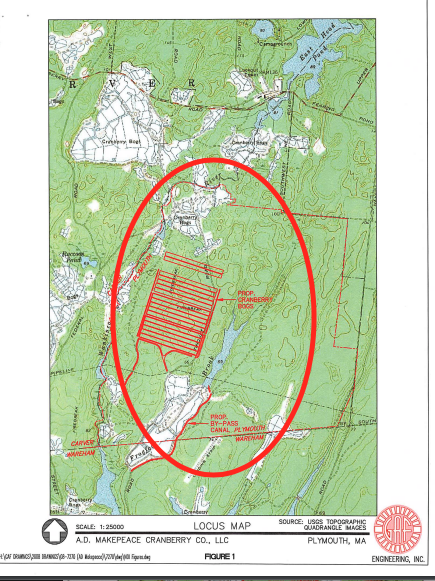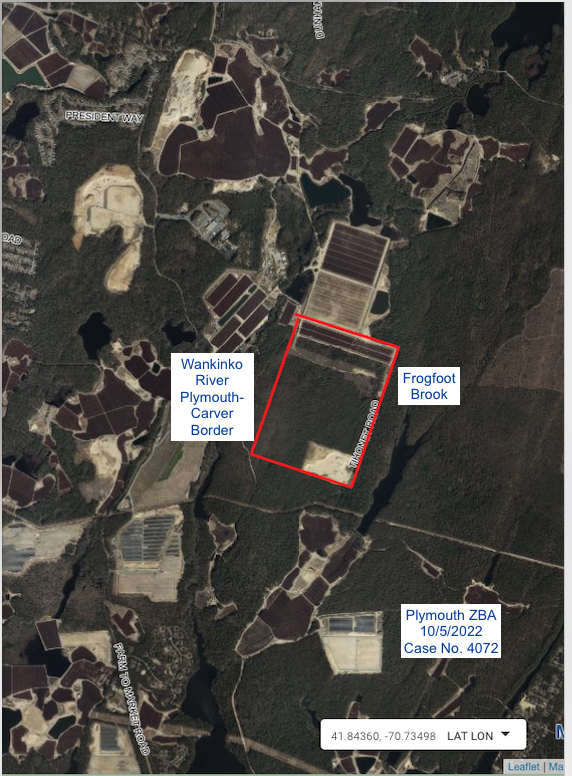In 2021, CLWC exposed Plymouth was allowing AD Makepeace to mine with an expired permit, 72 missing inspection reports
CLWC brought zoning enforcement action, Makepeace suspends mining operation but watchdog efforts continue to prevent more mining
About 32 acres of 214 acre mine has been stripped so far, photos document AD Makepeace mining in the Aquifer
Read more here about the site, and on going legal actions CLWC has taken.
In 2014, Town grants largest sand mine permit in state history
In 2014, the Plymouth Zoning Board of Appeals granted AD Makepeace a “Special Permit” for a 214-acre sand and gravel mine to extract 7.2 million cubic yards of earth. This sand is worth about $56 million. The location is known as 0 Tihonet Road or 0 Federal Road in Plymouth. It abuts Frogfoot River to the east and the Wankinko River to the west. It is in South Plymouth. See the permit here: 2014 Plymouth Permit to Makepeace
AD Makepeace claimed was “necessary and incidental” to build cranberry bogs. The Town went along with this ruse to evade the Town bylaw and granted the permit.
Below: AD Makepeace map showing the location of the mine and portraying it as a “cranberry bog” project.

After 2014, AD Makepeace started the mining operation. The Town let Makepeace keep mining with an expired permit and never required the inspection reports mandated under the permit.
Below: Drone video showing about 32 acres of the 214 mining operation under way. Image by licensed drone pilot.

Below: Google Earth aerial map showing 214 acre mining site outlined in red. The lower right shows the area already mined as of 2022.

See drone video here. At about 34 seconds you start to see the 35+ acres of mining.
In 2021, CLWC steps in to enforce the law
Town can’t account for missing sand
During the public hearing on December 7, 2022 on CLWC’s request for enforcement of the Bylaw, ZBA Chair Main stated:
“I don’t know where the sand went”
“I don’t know how much” they excavated and shipped from the site.
Town can’t account for missing land
Under the 2014 ZBA permit, Makepeace was supposed to donate 300 acres of land to conservation to Plymouth as mitigation. CLWC exposed that Makepeace had NOT donated the land but started mining anyway. The Town could not account for the land. Through two public hearings, Makepeace tried to convince the ZBA it had already donated the land. This turned out to be untrue. At the last minute at the December 7, 2022 hearing Makepeace did an about face, saying the land was not yet in conservation but would be soon. As of 2024, it is not clear Makepeace has donated the 300 acres.
Mining on hold — for now
CLWC continues to monitor the situation
Finally, after listening to CLWC’s evidence at the public hearings in 2021 and 2022, the ZBA agreed Makepeace’s permit expired and the reports were missing — but they denied the request for enforcement anyway. Makepeace’s lawyer told the ZBA said they had “no current plans” to continue the mining operation. In 2023, the Town allowed Makepeace to take about 20,000 cubic yards off the site for “agriculture.” Records available on request.
|
COMMUNITY LAND & WATER COALITION PRESS RELEASE
|
• Plymouth “earth removal” permit expired in 2020, Makepeace continues strip mining in endangered species habitat • Building Commissioner tells ZBA permit conditions for quarterly inspections are “discretionary” • In over eight years, no mandatory inspections done • Makepeace “double dips” cannot document compliance with condition to conserve 300 acres as required by the permit Save the Pine Barrens (STPB) appeared before the Plymouth Zoning Board of Appeals on Wednesday April 20, 2022 for a public hearing challenging the refusal by the Building Commissioner to enforce a 2014 earth removal permit issued to AD Makepeace (Makepeace). The Building Commissioner claimed the permit conditions requiring quarterly inspections of the project were “discretionary.” In 2014, the Plymouth Zoning Board of Appeals issued a 2 year earth removal permit to AD Makepeace to extract 7.2 million cubic yards of sand and gravel from 309 acres of globally rare endangered species habitat in south Plymouth. Makepeace claims the massive sand and gravel operation is solely necessary to build a 136-acre cranberry bog project. To date, only 11% of the bogs have been built but vast quantities of sand and gravel have been removed. The Building Commissioner produced no records to show the volume of earth removed or whether it was used for cranberry bogs as AD Makepeace claims. At the hearing, STPB told the Board that Makepeace used this same claim about building bogs in permit applications to the Town of Carver in order to get at least four earth removal permits since 2011 but has not built the cranberry bogs. Makepeace operates an industrial aggregate processing facility in Carver at its Read Custom Soils site. The Board renewed the expired 2014 permit three times without requiring evidence of the inspection reports, volumes of earth removed, documentation of truck routes, or payment of earth removal fees. The permit expired in March 2020. Makepeace is continuing to work at the site. The Town could not explain why the permit was allowed to expire in 2020, why conditions protecting groundwater were ignored, why there were no inspections, and why Makepeace had not provided satisfactory records to show they met the permit condition of conserving 300 acres of land. STPB’s attorney told the Town that Makepeace is “double dipping” by trying to use land sold to the state for conservation to satisfy the obligation to Plymouth to conserve 300 acres of land and this was not what the permit required. The Board asked Makepeace to provide further evidence that the 300 acres are conserved by the next meeting. Building Commissioner Mayo recommended that the Town hire the engineering firm of Beal+Thomas to investigate whether AD Makepeace is violating the 2014 permit. STPB objected on the grounds that AD Makepeace is a major client of Beals+Thomas and there is an obvious conflict of interest. “The Building Commissioner’s claim that permit compliance is ‘discretionary’ is like saying people driving in Plymouth don’t have to obey the speed limit because it is just a “recommendation” said Meg Sheehan, volunteer with Save the Pine Barrens. “On top of that, Makepeace is operating without a permit. That’s like saying it’s OK to drive without a permit in Plymouth.” Sheehan told the Board a special permit under zoning laws is a privilege not a right, and the Board owes the public the highest level of due diligence in making sure companies that get permits comply with them. The permit the Board granted to Makepeace in 2014 has specific protective conditions to protect the Plymouth Carver Sole Source Aquifer. STPB presented satellite images to show Makepeace appears to be excavating in the groundwater and may have unlawfully disposed of solid waste on a portion of the site. It appeared that cranberry bogs were built over the disposal site. The Board will continue the public hearing on Wednesday May 18, 2022 at 7 p.m. in the Great Hall at Plymouth Town Hall on Court Street. The site is a 136-acre parcel in south Plymouth near the Wareham border off Tihonet Road on Makepeace’s vast landholdings near Myles Standish State Forest. The land is globally rare pine barrens forest with the state’s highest ranking for endangered plants and animals. The area was targeted by MassWildlife in 2009 for protection but the agency has reneged on its statutory duty to protect forests and species under the Massachusetts Endangered Species Act. The forests and sand and gravel Makepeace is stripping off filter the Plymouth Carver Sole Source Aquifer that is very vulnerable to contamination. The 199 square mile Aquifer is the sole source of drinking water for seven towns, including Plymouth. In some areas, the Aquifer is already polluted with industrial wastes. |

[…] Plymouth: Stop the illegal AD Makepeace strip mine! […]